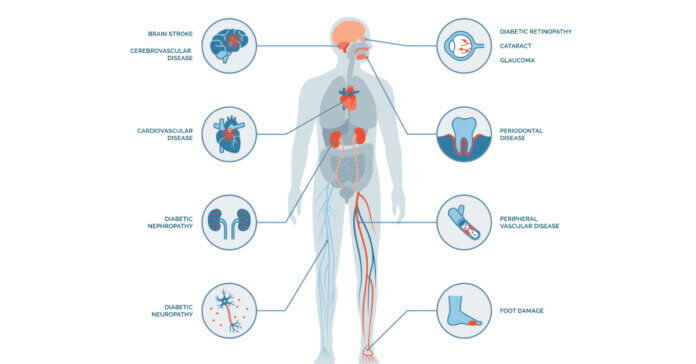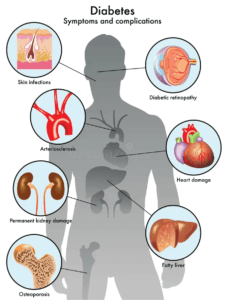Diabetes mellitus is a chronic metabolic disorder characterized by elevated blood glucose levels due to insufficient insulin production or impaired insulin utilization. Over time, uncontrolled diabetes can lead to a range of complications affecting various organ systems. Understanding these complications and their associated risks is crucial for effective management and prevention.
Microvascular Complications
Chronic hyperglycemia primarily damages small blood vessels, leading to microvascular complications:
- Diabetic Retinopathy: Prolonged high blood sugar levels can damage the retinal blood vessels, resulting in vision impairment and, in severe cases, blindness. Regular eye examinations are essential for early detection and management.
- Diabetic Nephropathy: Elevated glucose levels can harm the kidneys’ filtering units, potentially leading to kidney failure. Monitoring kidney function through urine and blood tests aids in early identification and intervention.
- Diabetic Neuropathy: Nerve damage, particularly in the extremities, can cause symptoms like numbness, tingling, and pain. This increases the risk of injuries and infections, emphasizing the importance of regular foot inspections.
Macrovascular Complications
Diabetes also accelerates large blood vessel damage, increasing the risk of macrovascular complications:
- Cardiovascular Disease (CVD): Individuals with diabetes are at a higher risk of heart diseases, including heart attacks and strokes. Maintaining optimal blood pressure and cholesterol levels is vital for reducing this risk.
- Peripheral Artery Disease (PAD): Reduced blood flow to the limbs can lead to pain, ulcers, and, in severe cases, amputation. Regular physical activity and smoking cessation are crucial preventive measures.
Risk Factors for Complications
Several factors increase the likelihood of developing diabetes-related complications:
- Poor Glycemic Control: Consistently high blood sugar levels are a primary risk factor. Studies have shown that maintaining blood sugar and blood pressure within target ranges can significantly reduce the risk of complications.
- Hypertension: High blood pressure exacerbates vascular damage, compounding the risk of both microvascular and macrovascular complications.
- Dyslipidemia: Elevated levels of LDL cholesterol and triglycerides contribute to arterial plaque formation, increasing cardiovascular risk.
- Duration of Diabetes: The longer an individual has diabetes, the greater the risk of developing complications, underscoring the importance of early diagnosis and management.
Preventive Strategies
Effective management and prevention of complications involve:
- Blood Sugar Management: Regular monitoring and maintaining blood glucose levels within target ranges are essential.
- Blood Pressure and Lipid Control: Utilizing medications and lifestyle modifications to manage blood pressure and lipid levels can reduce cardiovascular risks.
- Regular Screenings: Routine examinations for eyes, kidneys, and feet facilitate early detection and treatment of complications.
- Lifestyle Modifications: Engaging in regular physical activity, adhering to a balanced diet, avoiding smoking, and limiting alcohol intake are foundational to diabetes management.
Recent advancements in pharmacotherapy have also shown promise in reducing complication risks. For instance, the FDA has approved Ozempic (semaglutide) for reducing the risk of complications and death in adults with both type 2 diabetes and chronic kidney disease.
In conclusion, while diabetes poses significant health challenges, proactive management through lifestyle interventions, regular monitoring, and appropriate medical treatments can substantially mitigate the risks of complications, enhancing the quality of life for individuals living with this condition.













